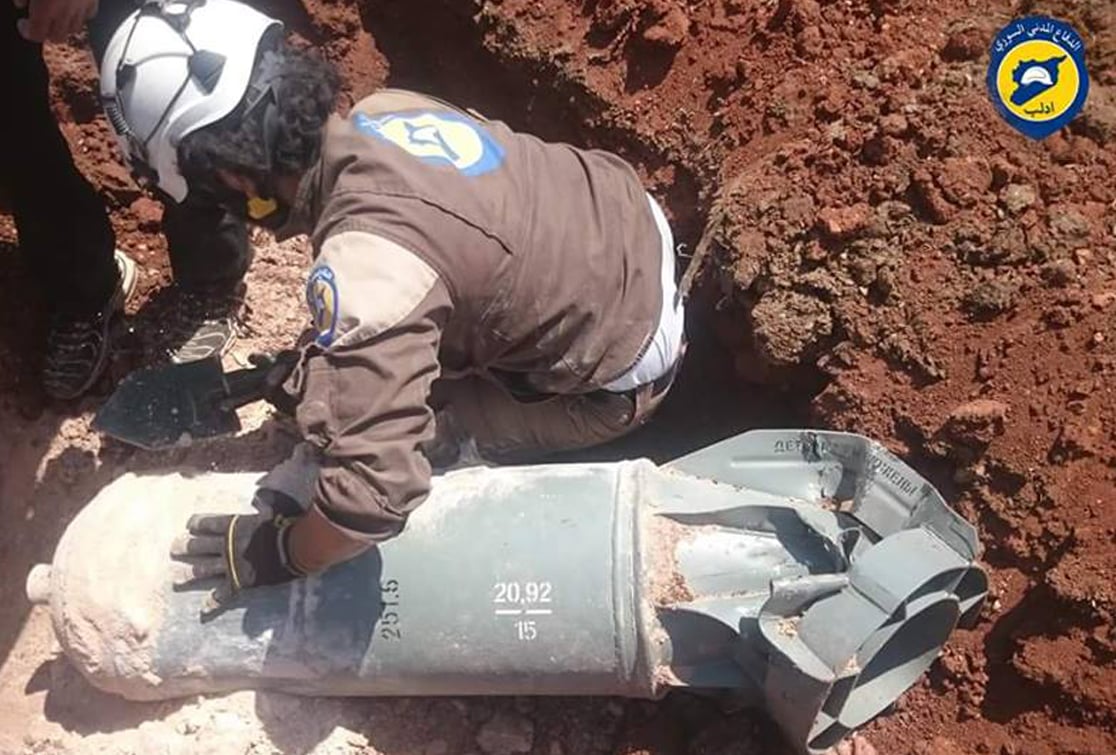The use of chemical weapons, bombardment, killing and displacement

SNHR has published a special report titled “Russian and Government Forces Retaliates Violently against Saraqeb City” that documented the increasing bombardment and destruction in Saraqeb city from 1 August 2016 to 8 August 2016, the period after the Russian mi-8 helicopter was shot down by armed opposition factions.
The report draws upon the daily observation and documentation. Additionally, SNHR contacted many eyewitnesses, survivors, and victims’ relatives where the report includes seven accounts.
The report notes that the indiscriminate violent bombardment reminds us of the victims and destruction that were recorded in Latakia suburbs when the su-24 fighter aircraft was shot down on 24 November 2015, over Jabal Al Turkman area by Turkish forces which led to a shameful and coward response by Russian forces that killed civilians and destroyed the area. Furthermore, the report notes that the residents received several text messages that encouraged them to negotiate in light of the bombardment and others contained threats in case the dead bodies of the pilots aren’t returned.
The report documents no less than 113 government and Russian airstrikes on Saraqeb city in the period of time covered by the report where Russian forces targeted one school and one market, in addition to three attacks with cluster munitions while government forces killed five civilians including three children and targeted Al Qebli market in the city in addition to one use of chemical weapons.
According to report, the increasing military attacks on Saraqeb city resulted in the displacement of no less than 1,800 families who fled to the agricultural lands around the city.
The report assures that government and Russian forces violate, beyond any doubt, Security Council Resolution No. 2139, Security Council Resolution No. 2455, and the Cessation of Hostilities agreement in the most horrendous manner. Also, Russian and government forces violated article 7 of the Rome Statute through the murder committed in a widespread and systematic manner which constitutes crimes against humanity.
The report affirms that the bombardment recorded in the report had targeted unarmed civilians and, consequently, government and Russian forces violated the provisions of International Human Rights Law which protects the right to life. In addition, these violations were committed as part of a non-international armed conflict which amounts to a war crime the elements of which have all been fulfilled.
According to report, the bombardment operations caused causalities and injuries and damaged several civilian facilities. There are very strong indications to believe that the damage was very excessive compared to the anticipated military benefits.
The report notes that the magnitude of the bombardment which is systematic and repetitive, the level of excessive used force, and the coordination of the attacks could not be but with a mere high guidance and it is a policy of the ruling regime.
The report demands that the Security Council takes additional measures for the implementation of its Resolutions no. 2139 and 2254 to insure commitments to cease the indiscriminate bombardment that causes daily murder and destruction, and to stop resorting to Vito in case of the perpetration of crimes against humanity and war crimes which is the case in Syria.
Additionally, the report affirms that the Russian regime must completely withdraw from Syria and must not side with the conflict party represented by Syrian regime then claims that it wishes to cease hostilities.
The recommendations include the demand of the High Commissioner for Human Rights to provide a report for the Human Rights Council and other bodies of the United Nations for the great incidents included the report.
Finally, the report calls on the implementation of the principle of the responsibility of protection (ICRtoP); after the exhaustion of the political steps through the Convention on the Arab League; and then the plan of Mr. Kofi Annan; therefore, resorting to Chapter VII and the application of the principle of the responsibility of protection (R2P) that was approved by the General Assembly of the United Nations is a must.


